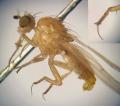Diptera.info :: Identification queries :: Other insects, spiders, etc.
|
Bee: which one?
|
|
| Rui Andrade |
Posted on 25-01-2008 10:40
|
|
Member Location: Portugal Posts: 3123 Joined: 19.06.07 |
Hi! I found this bee but I'm not sure where to place it. Can anybody help me? location: Barcelos, Portugal date: 200707/15   |
| Philippe moniotte |
Posted on 26-01-2008 11:38
|
|
Member Location: Heron, Belgium Posts: 865 Joined: 14.10.05 |
I would say likely Halictidae. There is a sure sign for that family, a groove on the last abdominal segment (which allow movement of the sting), but we would not see it in either of the pictures. Perhaps we can vaguely guess it in the second one. Do you have any rear view ? Philippe |
|
|
|
| cthirion |
Posted on 26-01-2008 11:55
|
|
Member Location: Awirs (Flémalle) Belgique Posts: 901 Joined: 13.08.04 |
Not Halictidae! Basal vein right! Perhaps Melittidae ?Melitta sp? cthirion |
| Rui Andrade |
Posted on 26-01-2008 12:50
|
|
Member Location: Portugal Posts: 3123 Joined: 19.06.07 |
The only one I have is this one: |
| Rui Andrade |
Posted on 27-01-2008 19:34
|
|
Member Location: Portugal Posts: 3123 Joined: 19.06.07 |
Well, it seems like that these solitary bees are often hard to identify. Thank you Philippe and cthirion for trying  |
| Christian Schmid-Egger |
Posted on 27-01-2008 19:58
|
|
Member Location: Germany, Berlin Posts: 233 Joined: 05.08.05 |
Its a Dasypoda spec. Regards, Christian |
| Rui Andrade |
Posted on 27-01-2008 23:10
|
|
Member Location: Portugal Posts: 3123 Joined: 19.06.07 |
Thank you Christian |
| Alvesgaspar |
Posted on 28-01-2008 00:04
|
|
Member Location: Lisbon, Portugal Posts: 573 Joined: 24.08.07 |
Well, all I can say is that these are exquisite photos.  Bees are hard to photograph because they are normally fast and restless. How did you manage to get these excellent shots? In the early morning, when they are still half frozen? Bees are hard to photograph because they are normally fast and restless. How did you manage to get these excellent shots? In the early morning, when they are still half frozen?Joaquim |
|
|
|
| Rui Andrade |
Posted on 28-01-2008 00:09
|
|
Member Location: Portugal Posts: 3123 Joined: 19.06.07 |
Yes, bees are difficult The photos were taken at 18h30. The day was cloudy and this bee was unusually slow. |
| komarik |
Posted on 10-02-2008 18:50
|
|
Member Location: RUS, Moscow reg. Posts: 23 Joined: 05.01.08 |
Hi-Hi!  ))) Melitta or Macropis))) Not Dasypoda!!! ))) Melitta or Macropis))) Not Dasypoda!!! |
|
|
|
| jorgemotalmeida |
Posted on 10-02-2008 20:05
|
|
Member Location: Viseu - PORTUGAL Posts: 9296 Joined: 05.06.06 |
The North is not so warm like Lisbon  Only today and yesterday we began *really" to have a very near Summer appealing.  I think that it is more hard to photograph ants than really the bees.  They are easy to photo. They are easy to photo.  |
| Christian Schmid-Egger |
Posted on 11-02-2008 09:12
|
|
Member Location: Germany, Berlin Posts: 233 Joined: 05.08.05 |
Hi Komarik, sorry, but what do you mean exactly? And why isn' it a Dasypoda? Melitta has 3 submarginal cells in forewing (the present species only 2), and Macropis is completely different (e.g. with a bicolored scopa on hindleg etc.). Look for both genera on www.galerie.hymis.de, and then we may go on discussing. Regards, Christian |
| Jump to Forum: |













